Ward A.W. The Cambridge History of British Foreign Policy. 1783-1919. Volume 3
Подождите немного. Документ загружается.

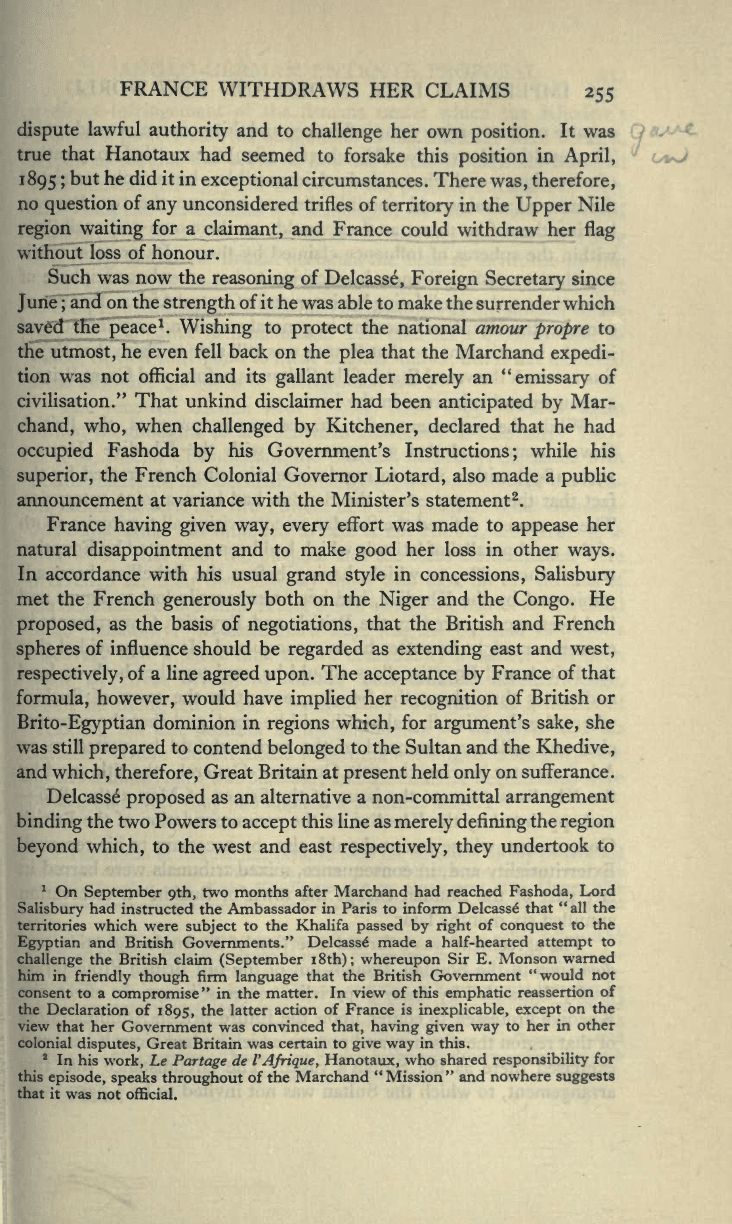
FRANCE
WITHDRAWS HER
CLAIMS
255
dispute
lawful
authority
and
to
challenge
her own
position.
It was
true
that
Hanotaux
had
seemed to
forsake this
position
in
April,
1895
;
but he
did
it
in
exceptional
circumstances.
There
was, therefore,
no
question
of
any
unconsidered
trifles of
territory
in
the
Upper
Nile
region
waiting
for a
claimant,
and
France
could withdraw her
flag
without loss of
honour.
Such was now
the
reasoning
of
Delcasse,
Foreign
Secretary
since
June
;
and on
the
strength
of it
he was
able
to make the
surrender
which
saved the
peace
1
.
Wishing
to
protect
the national
amour
propre
to
the
utmost,
he even
fell
back on
the
plea
that
the Marchand
expedi-
tion was
not official and its
gallant
leader
merely
an
"
emissary
of
civilisation." That unkind
disclaimer had
been
anticipated
by
Mar-
chand,
who,
when
challenged
by
Kitchener,
declared
that
he had
occupied
Fashoda
by
his
Government's
Instructions;
while
his
superior,
the French
Colonial Governor
Liotard,
also made a
public
announcement at variance with
the Minister's statement
2
.
France
having given way, every
effort was made to
appease
her
natural
disappointment
and to
make
good
her
loss
in other
ways.
In
accordance
with his usual
grand style
in
concessions,
Salisbury
met the French
generously
both on the
Niger
and the
Congo.
He
proposed,
as
the basis of
negotiations,
that the British
and French
spheres
of
influence should be
regarded
as
extending
east
and
west,
respectively,
of a
line
agreed
upon.
The
acceptance
by
France of
that
formula,
however,
would have
implied
her
recognition
of British
or
Brito-Egyptian
dominion
in
regions
which,
for
argument's
sake,
she
was still
prepared
to
contend
belonged
to the
Sultan and
the
Khedive,
and
which,
therefore,
Great
Britain at
present
held
only
on
sufferance.
Delcasse
proposed
as an alternative
a
non-committal
arrangement
binding
the
two
Powers
to
accept
this
line
as
merely
defining
the
region
beyond
which,
to the
west
and
east
respectively,
they
undertook
to
1
On
September 9th,
two
months
after Marchand had
reached
Fashoda,
Lord
Salisbury
had
instructed
the
Ambassador
in Paris to inform
Delcasse"
that
"
all the
territories
which
were
subject
to
the
Khalifa
passed by right
of
conquest
to the
Egyptian
and
British Governments."
Delcasse" made a half-hearted
attempt
to
challenge
the
British claim
(September
18th);
whereupon
Sir E.
Monson
warned
him
in
friendly
though
firm
language
that the
British Government
"would
not
consent
to a
compromise"
in the
matter.
In view of
this
emphatic
reassertion
of
the
Declaration of
1895,
the latter
action
of France is
inexplicable,
except
on the
view
that her
Government
was
convinced
that,
having given
way
to
her
in other
colonial
disputes,
Great Britain
was certain
to
give
way
in this.
2
In his
work,
Le
Portage
de
I'Afrique,
Hanotaux,
who
shared
responsibility
for
this
episode,
speaks
throughout
of
the
Marchand
"
Mission"
and
nowhere
suggests
that
it
was
not
official.

256
IMPERIAL
POLICY
IN OLD
AND NEW WORLD
acquire
neither
territory
nor influence
;
and
this
proposal
was
adopted.
The
resulting
Convention
(March
21st,
1899)
thus
settled no
question
of
sovereignty
—
which
was, indeed,
impossible
—
but
simply
restricted
the area
of
rivalry
and
possible dispute
between
the
two
Powers,
leaving
them free to act as
they
would,
on their
own
responsibility,
within the
spheres
of
influence claimed
by
them. Its
greatest
merit
was
that it
satisfied
France,
by
securing
to her an
enlarged
sphere
of
operations
and
consolidating
her interests
in Central Africa.
By
mutual
consent,
the
Egyptian
Question
in
general
was
in
no
way
introduced
into the
negotiations
;
so that France was
still able to claim that
Egypt
was
as much the vassal
State
of the Sultan as
before,
and Great Britain
a
stranger
and
sojourner
in
the
land.
While the
settlement
with France was
in
progress,
the British
Government concluded an
agreement
with the Khedive
(January
19th,
1899)
with a
view
to
regularising
the situation created
by
the
fact that
the
reconquest
of
the
Soudan
had
been
a
joint enterprise.
The
agreement
defined the Soudan
as
comprising
all
territories
south
of
the
22nd
parallel
of latitude which
had been evacuated
by
Egyptian
troops
since
1882,
or
which,
having
before the Rebellion been
ad-
ministered
by
the
Khedive,
had been
temporarily
lost to
Egypt
and
had
been
reconquered
by
the British
and
Egyptian
Governments in
concert,
or
might
hereafter be so
reconquered.
It
was
provided
that
the
British and
Egyptian
flags
should be
used
together
both on land
and water
throughout
the
Soudan,
except
in the town of
Suakin,
where
the
Egyptian
flag
alone
should be
used,
and that the
supreme
civil
and
military
command
of the
region
should be
vested
in
an
Administrator
bearing
the title
Governor-General
—
the
title
used
by
the
Khedives
prior
to the issue
of the
firman of
May
27th,
1866
—
and
appointed by
the
Khedive
on the recommendation
of
the British
Government,
whose
assent
should, also,
be
necessary
to
his
removal.
Exterritoriality
and,
in
consequence,
mixed
tribunals were
barred
in
any
part
of the Soudan
except
the town
of
Suakin
—
a reservation
annulled
six months later.
The
agreement
was a formal
assertion
of an
Anglo-Egyptian
con-
dominium
in the
Soudan,
though
not of
the
full
British
Protectorate
loudly
demanded
by many
imperialist
voices
at home. In
effect,
the
Khedive
professed
to
confer
upon
the
future
British Administrators
of that
region
the
position
and
powers
which he
had himself held
and
exercised
there
as
the
Sultan's vassal.
The circumstance
that
this
arrangement,
to which the
Sultan was
not invited to be
a
party,
was
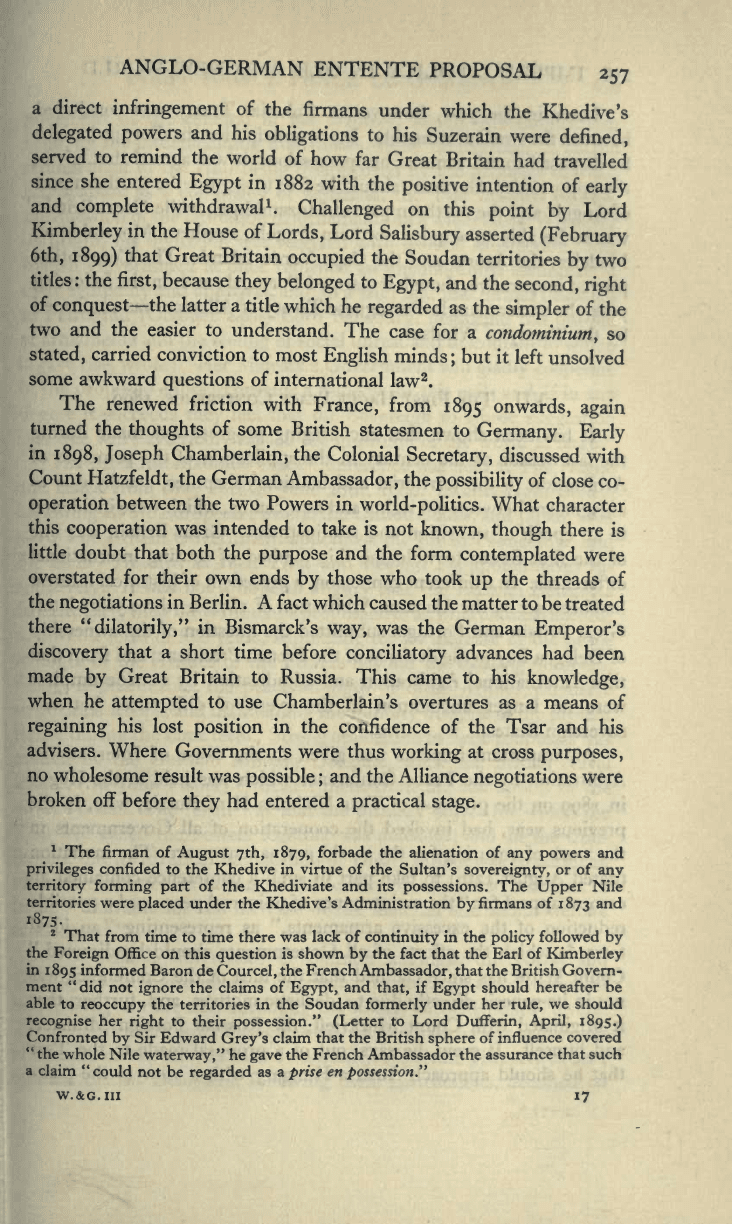
ANGLO-GERMAN
ENTENTE
PROPOSAL
257
a direct
infringement
of
the
firmans
under
which
the
Khedive's
delegated powers
and
his
obligations
to his
Suzerain
were
defined,
served to remind
the
world
of
how
far
Great
Britain had
travelled
since
she
entered
Egypt
in
1882 with
the
positive
intention of
early
and
complete
withdrawal
1
.
Challenged
on
this
point
by
Lord
Kimberley
in
the
House of
Lords,
Lord
Salisbury
asserted
(February
6th,
1899)
that
Great
Britain
occupied
the
Soudan
territories
by
two
titles
:
the
first,
because
they
belonged
to
Egypt,
and
the
second,
right
of
conquest—
the latter a
title
which
he
regarded
as
the
simpler
of
the
two and
the easier
to
understand.
The
case
for a
condominium
,
so
stated,
carried
conviction
to most
English
minds;
but it
left
unsolved
some
awkward
questions
of
international
law
2
.
The
renewed
friction
with
France,
from
1895
onwards,
again
turned
the
thoughts
of
some British
statesmen to
Germany.
Early
in
1898, Joseph
Chamberlain,
the
Colonial
Secretary,
discussed
with
Count
Hatzfeldt,
the German
Ambassador,
the
possibility
of
close
co-
operation
between
the two
Powers in
world-politics.
What
character
this
cooperation
was
intended to
take is
not
known,
though
there is
little
doubt
that
both the
purpose
and
the
form
contemplated
were
overstated for
their
own ends
by
those who
took
up
the
threads
of
the
negotiations
in
Berlin. A fact
which
caused
the matter
to
be
treated
there
"
dilatorily,'
'
in
Bismarck's
way,
was
the German
Emperor's
discovery
that a
short
time before
conciliatory
advances
had
been
made
by
Great
Britain to Russia.
This came
to his
knowledge,
when
he
attempted
to
use
Chamberlain's
overtures
as
a
means of
regaining
his
lost
position
in the
confidence
of
the
Tsar and
his
advisers.
Where
Governments
were
thus
working
at
cross
purposes,
no
wholesome
result was
possible
;
and
the Alliance
negotiations
were
broken
off
before
they
had
entered
a
practical
stage.
1
The
firman of
August
7th, 1879,
forbade the
alienation of
any powers
and
privileges
confided to
the Khedive in virtue
of
the Sultan's
sovereignty,
or
of
any
territory
forming
part
of the Khediviate
and
its
possessions.
The
Upper
Nile
territories were
placed
under
the Khedive's Administration
by
firmans of
1873
and
1875.
2
That
from time
to time there
was lack of
continuity
in the
policy
followed
by
the
Foreign
Office on
this
question
is shown
by
the
fact
that
the
Earl of
Kimberley
in
1895
informed Baron de
Courcel,
the French
Ambassador,
that
the British
Govern-
ment
"
did
not
ignore
the claims of
Egypt,
and
that,
if
Egypt
should
hereafter be
able
to
reoccupy
the territories
in the Soudan
formerly
under
her
rule,
we should
recognise
her
right
to
their
possession."
(Letter
to Lord
Dufferin,
April,
1895.)
Confronted
by
Sir
Edward
Grey's
claim that
the
British
sphere
of influence
covered
"
the
whole
Nile
waterway,"
he
gave
the French Ambassador
the
assurance that
such
a
claim
"could
not be
regarded
as a
prise
en
possession.'*
w.&g.iii
17
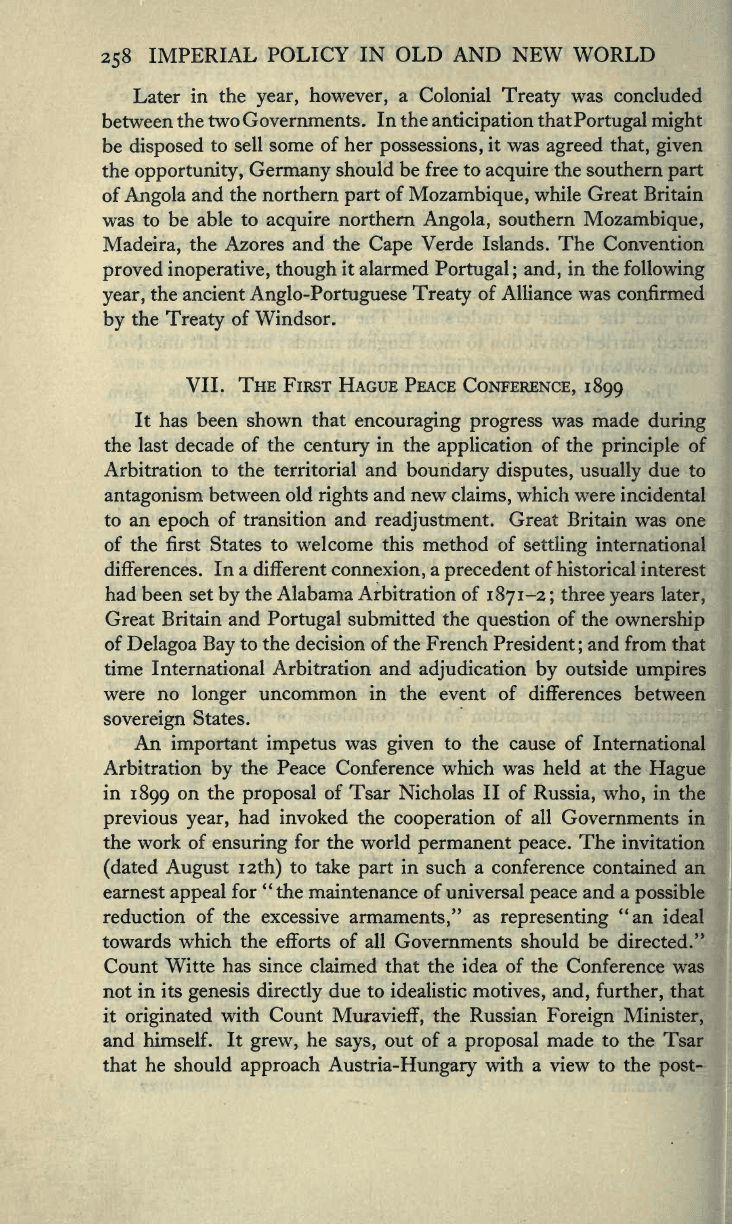
258
IMPERIAL
POLICY
IN OLD
AND NEW WORLD
Later
in
the
year,
however,
a
Colonial
Treaty
was
concluded
between
the
two
Governments.
In
the
anticipation
that
Portugal might
be
disposed
to sell some
of her
possessions,
it
was
agreed
that,
given
the
opportunity,
Germany
should be free
to
acquire
the southern
part
of
Angola
and
the
northern
part
of
Mozambique,
while Great
Britain
was
to
be able
to
acquire
northern
Angola,
southern
Mozambique,
Madeira,
the Azores and
the
Cape
Verde Islands. The Convention
proved inoperative,
though
it
alarmed
Portugal
;
and,
in the
following
year,
the ancient
Anglo-Portuguese Treaty
of
Alliance was
confirmed
by
the
Treaty
of Windsor.
VII.
The
First Hague Peace
Conference,
1899
It has
been shown
that
encouraging progress
was
made
during
the
last decade of
the
century
in
the
application
of the
principle
of
Arbitration
to the territorial
and
boundary disputes, usually
due to
antagonism
between
old
rights
and
new
claims,
which were
incidental
to
an
epoch
of
transition
and
readjustment.
Great Britain
was one
of the first States to
welcome this
method of
settling
international
differences.
In a different
connexion,
a
precedent
of
historical interest
had been set
by
the Alabama Arbitration
of
1
871-2
;
three
years
later,
Great Britain and
Portugal
submitted
the
question
of
the
ownership
of
Delagoa Bay
to the decision of the French
President
;
and
from that
time International
Arbitration and
adjudication by
outside
umpires
were
no
longer
uncommon in the event of
differences between
sovereign
States.
An
important
impetus
was
given
to
the cause of
International
Arbitration
by
the Peace
Conference which was held at
the
Hague
in
1899
on the
proposal
of
Tsar Nicholas
II
of
Russia, who,
in
the
previous
year,
had
invoked the
cooperation
of
all
Governments in
the work
of
ensuring
for
the world
permanent
peace.
The invitation
(dated August 12th)
to
take
part
in such a conference
contained an
earnest
appeal
for
"
the
maintenance of universal
peace
and a
possible
reduction
of the
excessive
armaments,"
as
representing
"an ideal
towards
which the
efforts of
all
Governments should be directed.
"
Count
Witte has since
claimed that the
idea of
the
Conference was
not
in its
genesis
directly
due to idealistic
motives, and,
further,
that
it
originated
with Count
Muravieff,
the Russian
Foreign
Minister,
and himself.
It
grew,
he
says,
out of a
proposal
made to the Tsar
that
he
should
approach
Austria-Hungary
with
a view to the
post-
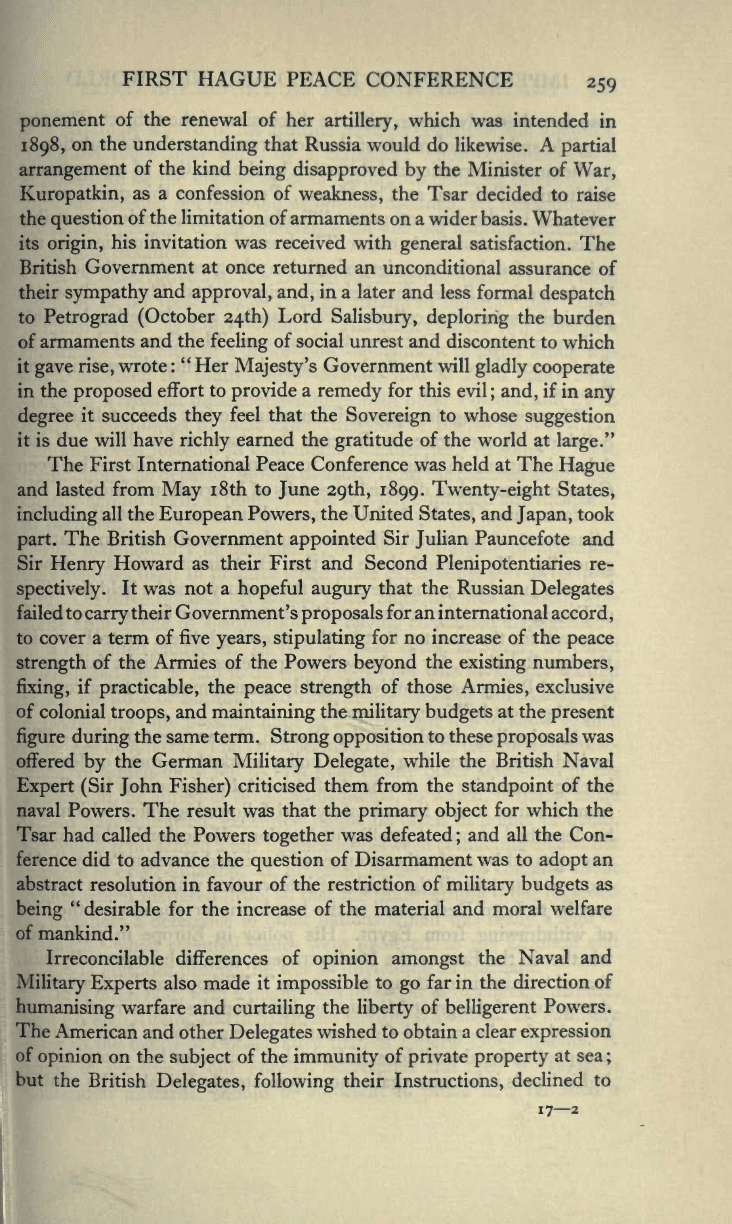
FIRST
HAGUE
PEACE
CONFERENCE
259
ponement
of
the
renewal of
her
artillery,
which was
intended in
1898,
on
the
understanding
that
Russia
would do
likewise. A
partial
arrangement
of the
kind
being disapproved
by
the
Minister of
War,
Kuropatkin,
as a
confession
of
weakness,
the Tsar
decided to
raise
the
question
of
the
limitation
of
armaments on a
wider basis.
Whatever
its
origin,
his invitation
was
received
with
general
satisfaction.
The
British
Government
at once
returned
an
unconditional
assurance of
their
sympathy
and
approval,
and,
in
a later and
less
formal
despatch
to
Petrograd
(October 24th)
Lord
Salisbury,
deploring
the
burden
of
armaments
and the
feeling
of
social unrest
and
discontent
to
which
it
gave
rise,
wrote :
"
Her
Majesty's
Government will
gladly cooperate
in the
proposed
effort
to
provide
a
remedy
for
this evil
; and,
if
in
any
degree
it succeeds
they
feel
that
the
Sovereign
to whose
suggestion
it is due
will have
richly
earned
the
gratitude
of the world at
large."
The
First International
Peace
Conference
was
held at The
Hague
and
lasted
from
May
18th to
June
29th,
1899.
Twenty-eight
States,
including
all the
European
Powers,
the United
States,
and
Japan,
took
part.
The British Government
appointed
Sir
Julian
Pauncefote and
Sir
Henry
Howard
as their
First and
Second
Plenipotentiaries
re-
spectively.
It
was
not a
hopeful augury
that the
Russian
Delegates
failed to
carry
their Government's
proposals
for
an international
accord,
to
cover a
term
of five
years,
stipulating
for no increase of
the
peace
strength
of the Armies of the
Powers
beyond
the
existing
numbers,
fixing,
if
practicable,
the
peace
strength
of those
Armies,
exclusive
of
colonial
troops,
and
maintaining
the
military budgets
at
the
present
figure during
the same
term.
Strong opposition
to these
proposals
was
offered
by
the German
Military
Delegate,
while the British
Naval
Expert
(Sir
John
Fisher)
criticised
them from
the
standpoint
of
the
naval
Powers. The result was
that the
primary
object
for which
the
Tsar had
called the Powers
together
was defeated
;
and
all
the Con-
ference did to
advance the
question
of Disarmament
was to
adopt
an
abstract
resolution in favour of
the restriction of
military budgets
as
being
"desirable for
the
increase
of
the
material
and moral
welfare
of
mankind."
Irreconcilable differences
of
opinion
amongst
the Naval
and
Military Experts
also made
it
impossible
to
go
far in the
direction
of
humanising
warfare
and
curtailing
the
liberty
of
belligerent
Powers.
The
American and
other
Delegates
wished to obtain
a clear
expression
of
opinion
on
the
subject
of the
immunity
of
private
property
at sea
;
but
the
British
Delegates,
following
their
Instructions,
declined
to
17—2
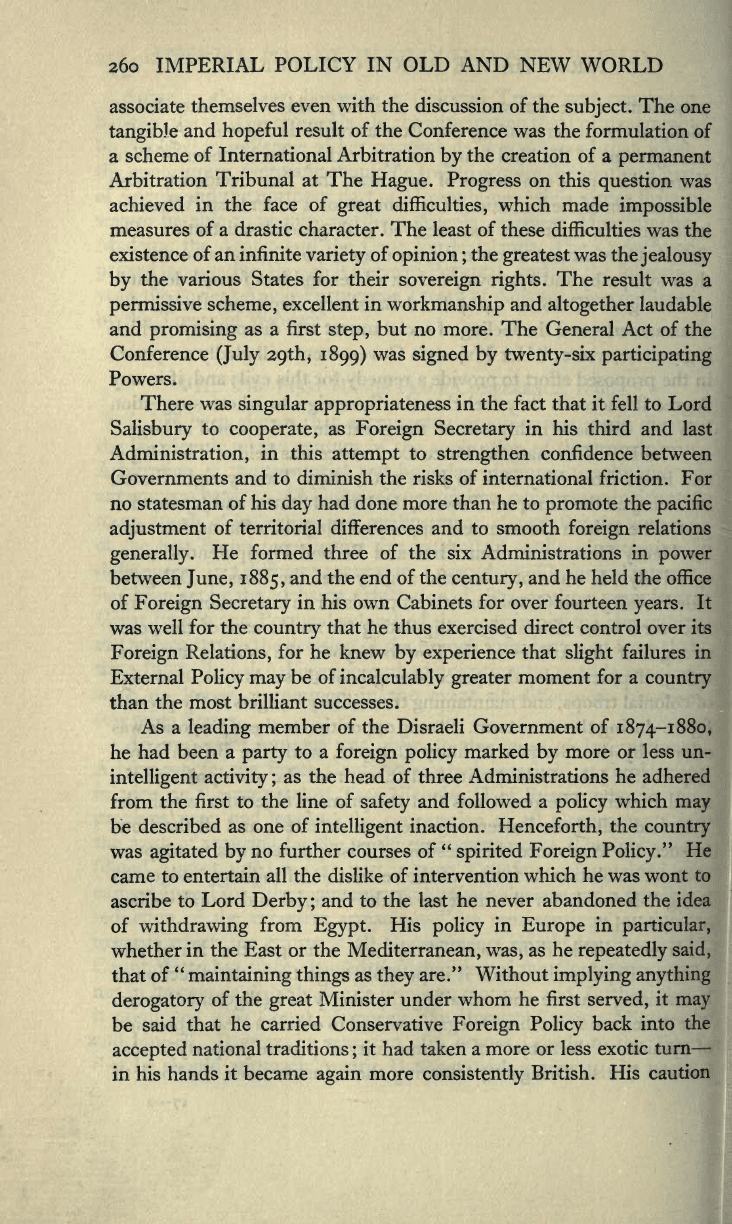
260
IMPERIAL
POLICY
IN
OLD AND
NEW
WORLD
associate
themselves
even with the
discussion of
the
subject.
The
one
tangible
and
hopeful
result of
the Conference was
the
formulation of
a
scheme
of International Arbitration
by
the
creation of a
permanent
Arbitration
Tribunal at
The
Hague. Progress
on
this
question
was
achieved
in the face of
great
difficulties,
which made
impossible
measures
of a
drastic character. The least of
these
difficulties was
the
existence
of an infinite
variety
of
opinion
;
the
greatest
was
the
jealousy
by
the
various
States for their
sovereign rights.
The
result was
a
permissive
scheme,
excellent in
workmanship
and
altogether
laudable
and
promising
as a
first
step,
but no
more.
The
General Act of
the
Conference
(July 29th,
1899)
was
signed
by twenty-six
participating
Powers.
There
was
singular appropriateness
in the
fact that it
fell
to Lord
Salisbury
to
cooperate,
as
Foreign Secretary
in his third and
last
Administration,
in this
attempt
to
strengthen
confidence between
Governments
and to
diminish the
risks
of international friction.
For
no statesman of
his
day
had
done
more than he to
promote
the
pacific
adjustment
of territorial differences
and to smooth
foreign
relations
generally.
He formed three
of the six
Administrations
in
power
between
June,
1885,
and the end of the
century,
and he
held the office
of
Foreign
Secretary
in his
own Cabinets
for
over fourteen
years.
It
was
well
for the
country
that he thus exercised direct
control
over
its
Foreign
Relations,
for
he knew
by
experience
that
slight
failures
in
External
Policy may
be of
incalculably greater
moment
for
a
country
than
the most
brilliant
successes.
As a
leading
member of the Disraeli Government
of 1
874-1
880,
he
had been
a
party
to a
foreign policy
marked
by
more
or less un-
intelligent
activity
;
as the head of
three
Administrations
he
adhered
from the
first
to the line
of
safety
and followed a
policy
which
may
be
described
as one
of
intelligent
inaction.
Henceforth,
the
country
was
agitated
by
no further courses of
"
spirited Foreign
Policy."
He
came
to entertain
all
the dislike of intervention
which
he
was wont
to
ascribe
to Lord
Derby
;
and to the last he never
abandoned the
idea
of
withdrawing
from
Egypt.
His
policy
in
Europe
in
particular,
whether
in the
East
or the
Mediterranean,
was,
as he
repeatedly
said,
that of
"
maintaining
things
as
they
are."
Without
implying
anything
derogatory
of the
great
Minister under
whom he
first
served,
it
may
be
said
that
he carried
Conservative
Foreign Policy
back
into
the
accepted
national traditions
;
it had taken
a more or less exotic
turn
—
in
his
hands
it
became
again
more
consistently
British.
His caution
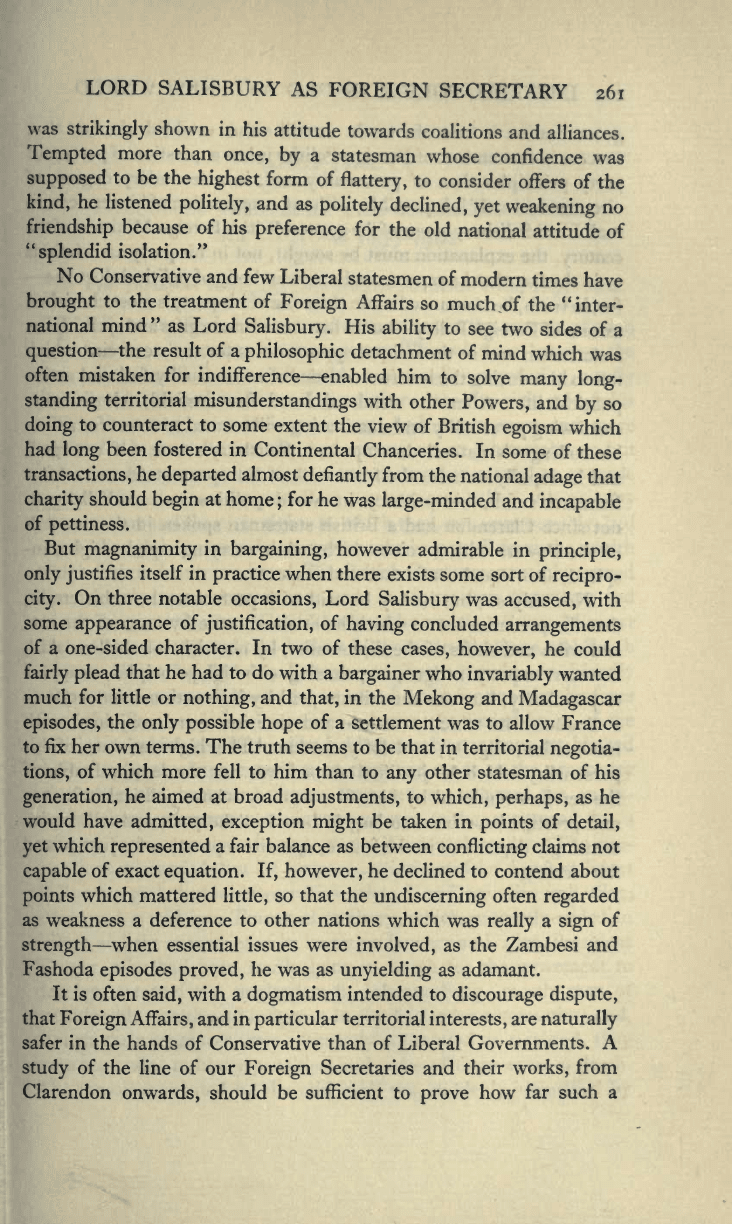
LORD
SALISBURY
AS
FOREIGN
SECRETARY
261
was
strikingly
shown
in
his
attitude
towards
coalitions
and
alliances.
Tempted
more
than
once,
by
a
statesman
whose
confidence was
supposed
to
be
the
highest
form
of
flattery,
to
consider
offers of
the
kind,
he
listened
politely,
and
as
politely
declined,
yet
weakening
no
friendship
because of
his
preference
for
the old
national
attitude of
"splendid
isolation."
No
Conservative
and
few
Liberal
statesmen of
modern
times
have
brought
to the
treatment of
Foreign
Affairs
so
much
of
the
"inter-
national
mind
"
as
Lord
Salisbury.
His
ability
to
see two
sides of
a
question
—
the result of
a
philosophic
detachment of
mind
which
was
often mistaken
for
indifference
—
enabled
him
to
solve
many
long-
standing
territorial
misunderstandings
with
other
Powers,
and
by
so
doing
to counteract to
some
extent
the
view of
British
egoism
which
had
long
been fostered in
Continental
Chanceries. In
some of
these
transactions,
he
departed
almost
defiantly
from
the
national
adage
that
charity
should
begin
at
home
;
for
he
was
large-minded
and
incapable
of
pettiness.
But
magnanimity
in
bargaining,
however
admirable in
principle,
only justifies
itself in
practice
when
there exists
some sort of
recipro-
city.
On three notable
occasions,
Lord
Salisbury
was
accused,
with
some
appearance
of
justification,
of
having
concluded
arrangements
of
a
one-sided
character. In
two
of
these
cases,
however,
he
could
fairly
plead
that
he
had
to do with a
bargainer
who
invariably
wanted
much
for little
or
nothing,
and
that,
in
the
Mekong
and
Madagascar
episodes,
the
only
possible hope
of a
settlement
was to
allow France
to
fix
her
own
terms.
The
truth
seems to
be that in
territorial
negotia-
tions,
of which more
fell
to him
than
to
any
other
statesman of his
generation,
he aimed
at
broad
adjustments,
to
which,
perhaps,
as
he
would have
admitted,
exception
might
be taken in
points
of
detail,
yet
which
represented
a fair
balance
as
between
conflicting
claims not
capable
of exact
equation.
If, however,
he declined to contend about
points
which
mattered
little,
so that the
undiscerning
often
regarded
as
weakness a
deference
to other nations
which was
really
a
sign
of
strength
—
when essential issues were
involved,
as the Zambesi
and
Fashoda
episodes
proved,
he
was as
unyielding
as adamant.
It
is
often
said,
with
a
dogmatism
intended
to
discourage
dispute,
that
Foreign
Affairs,
and in
particular
territorial
interests,
are
naturally
safer in
the hands of
Conservative
than
of
Liberal
Governments.
A
study
of
the
line
of
our
Foreign
Secretaries
and
their
works,
from
Clarendon
onwards,
should
be
sufficient
to
prove
how
far
such a
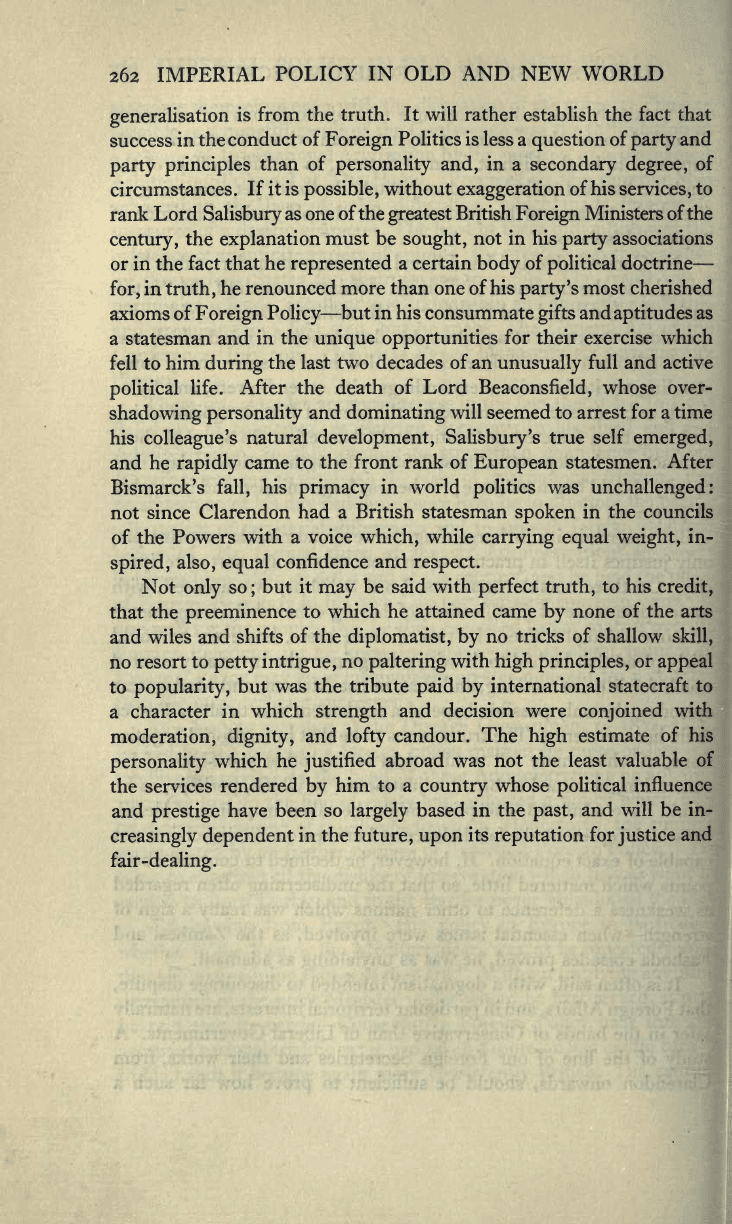
262
IMPERIAL
POLICY
IN
OLD AND NEW
WORLD
generalisation
is from the
truth. It will
rather establish the
fact that
success
in
the conduct
of
Foreign
Politics is less
a
question
of
party
and
party
principles
than of
personality
and,
in a
secondary degree,
of
circumstances.
If
it
is
possible,
without
exaggeration
of
his
services,
to
rank
Lord
Salisbury
as one
of
the
greatest
British
Foreign
Ministers
of the
century,
the
explanation
must be
sought,
not
in
his
party
associations
or
in
the
fact that
he
represented
a certain
body
of
political
doctrine
—
for,
in
truth,
he renounced
more
than
one
of his
party's
most cherished
axioms
of
Foreign Policy
—
but
in his
consummate
gifts
and
aptitudes
as
a
statesman
and
in
the
unique
opportunities
for their
exercise
which
fell to
him
during
the last two decades
of an
unusually
full and active
political
life.
After the death
of Lord
Beaconsneld,
whose over-
shadowing personality
and
dominating
will
seemed
to
arrest
for a time
his
colleague's
natural
development,
Salisbury's
true
self
emerged,
and
he
rapidly
came to the front rank
of
European
statesmen.
After
Bismarck's
fall,
his
primacy
in world
politics
was
unchallenged:
not since
Clarendon
had a British statesman
spoken
in the councils
of
the Powers
with
a voice
which,
while
carrying
equal
weight,
in-
spired,
also,
equal
confidence
and
respect.
Not
only
so
;
but it
may
be
said
with
perfect
truth,
to
his
credit,
that the
preeminence
to which he attained came
by
none of the arts
and wiles
and
shifts of
the
diplomatist, by
no tricks of shallow
skill,
no resort
to
petty
intrigue,
no
paltering
with
high
principles,
or
appeal
to
popularity,
but was
the tribute
paid
by
international
statecraft
to
a
character
in which
strength
and decision were
conjoined
with
moderation,
dignity,
and
lofty
candour. The
high
estimate
of
his
personality
which
he
justified
abroad was not the least
valuable
of
the services
rendered
by
him
to
a
country
whose
political
influence
and
prestige
have been
so
largely
based
in the
past,
and will
be in-
creasingly
dependent
in
the
future,
upon
its
reputation
for
justice
and
fair-dealing.

CHAPTER
IV
THE
BOER
WAR
AND
THE
INTERNATIONAL
SITUATION,
1899-1902
I. The
Jameson
Raid and
the
South
African
War,
1895-1902
THE
storm which
broke
over
South Africa
in
the
autumn of
1899
had
been
brooding
for
some
years.
The
relations
between
the
Boers of
the
small
Transvaal
Republic
and
the alien
population,
mostly
British,
who
flowed in
increasing
numbers
into the rich
gold-fields
which
their
enterprise
had
opened
up,
had
grown
more and
more
strained. A
great
British
city
had
sprung
up
at
Johannesburg;
but
President
Kruger
was
too
narrow-minded and
masterful
to
concede
to the
Uitlanders,
as
the non-Boer
settlers were
called,
the
equality
of
treatment
and
the civic
rights
to which
they,
not
unreasonably,
laid
claim,
though
he was
ready enough
to
take
heavy
toll from
the wealth
which
their
industry produced.
The
British
Government
vainly pressed
him
to
make
some
concessions; and,
in
1895,
when
discontent
had
grown
dangerously
acute,
Cecil
Rhodes,
who
was then
Prime-Minister
of
the
Cape
Colony
and who had
set
his
heart
on
creating
a real
South
African
Union
by
drawing
Britons
and
Boers
together
in
friendly
cooperation,
in
an evil hour
countenanced
a
plot
for
wresting by
force
from
the
Transvaal
the
recognition,
obstinately
denied
by
it,
of
the
position
to which
the Uitlanders held
themselves
to
have
established
their
title
by
the
large
contribution
they
had
made
to the
prosperity
of
a
poor
and
backward
State.
Preparations
followed for an in-
surrectionary
movement
in
Johannesburg,
to
'be
supported by
a
military
force
secretly
collected
on
the
Transvaal
border.
The
pre-
parations
miscarried
;
but
Dr
Jameson,
an
intimate friend
and confidant
of
Rhodes,
took the
bit
between
his
teeth
and,
on
December
29th,
1895,
attempted
a raid
into
Transvaal
territory,
which
promptly
ended
in
failure and
the
surrender
of
its
leader
on
January
2nd,
1896.
President
Kruger,
who
had
been
warily
lying
in
watch
for
the
movement
to
develop,
arrested the
ringleaders
in
Johannesburg
—
mostly
men
of
considerable
wealth
and
influence
in
the
Uitlander
community;
and,
though
their
sentences
were
ultimately
commuted
or
remitted,
they
were
sentenced
to
heavy
penalties,
and
some
of
them
even to
death.
The
sensation
created
by
the
raid
itself
was
suddenly
intensified
by
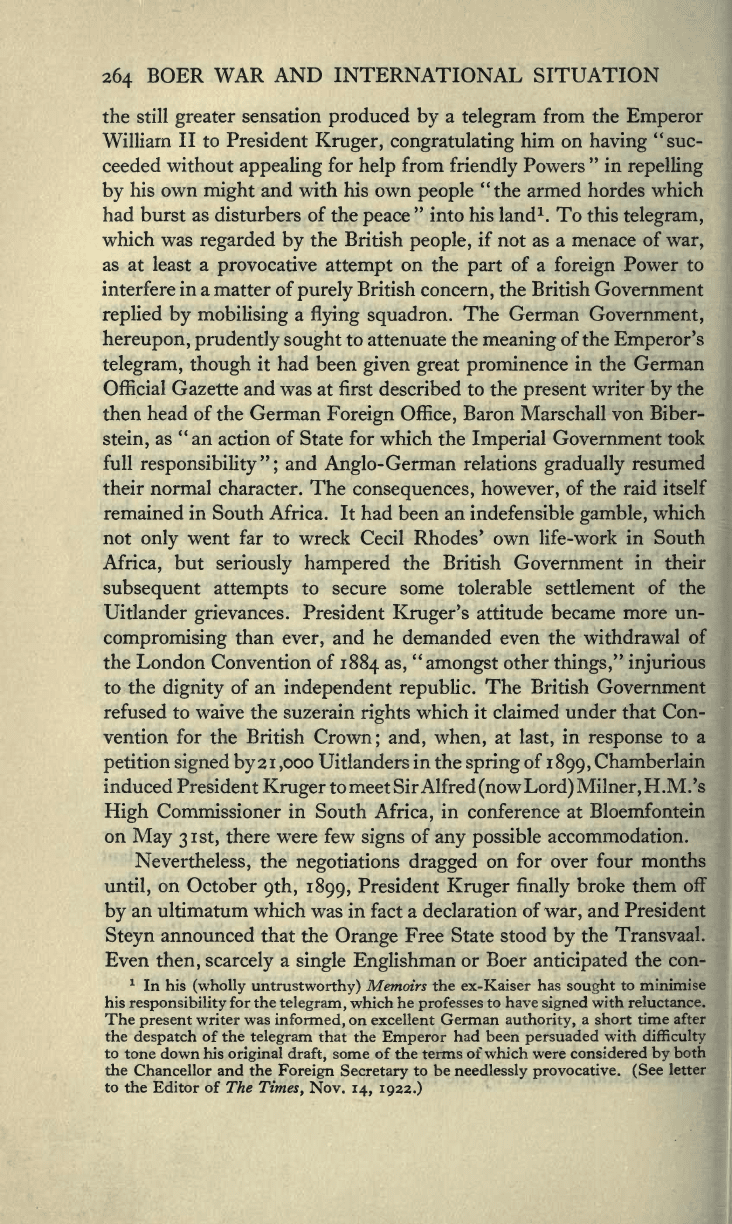
264
BOER
WAR
AND
INTERNATIONAL
SITUATION
the still
greater
sensation
produced by
a
telegram
from the
Emperor
William
II
to
President
Kruger,
congratulating
him on
having
"suc-
ceeded
without
appealing
for
help
from
friendly
Powers
"
in
repelling
by
his own
might
and
with
his own
people
"the armed
hordes which
had
burst
as
disturbers
of
the
peace
"
into his land
1
.
To
this
telegram,
which was
regarded
by
the British
people,
if
not
as a menace
of
war,
as
at least
a
provocative
attempt
on
the
part
of
a
foreign
Power
to
interfere
in
a
matter
of
purely
British
concern,
the British
Government
replied
by
mobilising
a
flying squadron.
The German
Government,
hereupon,
prudently sought
to attenuate
the
meaning
of
the
Emperor's
telegram, though
it
had
been
given great
prominence
in
the German
Official
Gazette and was at
first described to
the
present
writer
by
the
then
head of
the
German
Foreign
Office,
Baron
Marschall
von
Biber-
stein,
as "an
action
of
State
for which
the
Imperial
Government took
full
responsibility
"
;
and
Anglo-
German relations
gradually
resumed
their
normal
character.
The
consequences,
however,
of
the raid itself
remained
in
South
Africa.
It
had
been an indefensible
gamble,
which
not
only
went
far
to wreck Cecil Rhodes' own
life-work in South
Africa,
but
seriously hampered
the British
Government
in
their
subsequent attempts
to secure some tolerable settlement
of
the
Uitlander
grievances.
President
Kruger
's
attitude
became
more un-
compromising
than
ever,
and he demanded even the withdrawal
of
the
London
Convention of
1884
as,
"amongst
other
things,"
injurious
to
the
dignity
of an
independent republic.
The
British
Government
refused
to waive the suzerain
rights
which it
claimed under that Con-
vention
for
the
British
Crown;
and, when,
at
last,
in
response
to
a
petition signed by
21
,000
Uitlanders
in
the
spring
of
1899,
Chamberlain
induced
President
Kruger
to meetSir
Alfred(nowLord)Milner,H.M.
,
s
High
Commissioner
in
South
Africa,
in
conference at
Bloemfontein
on
May 31st,
there were
few
signs
of
any
possible
accommodation.
Nevertheless,
the
negotiations dragged
on
for
over
four
months
until,
on
October
9th,
1899,
President
Kruger
finally
broke them
off
by
an
ultimatum
which
was in
fact
a declaration
of
war,
and
President
Steyn
announced
that
the
Orange
Free State stood
by
the
Transvaal.
Even
then,
scarcely
a
single
Englishman
or Boer
anticipated
the
con-
1
In
his
(wholly
untrustworthy)
Memoirs
the
ex-Kaiser has
sought
to
minimise
his
responsibility
for
the
telegram,
which
he
professes
to have
signed
with reluctance.
The
present
writer
was
informed,
on excellent
German
authority,
a
short
time after
the
despatch
of the
telegram
that the
Emperor
had been
persuaded
with
difficulty
to
tone down his
original draft,
some of
the terms
of
which
were
considered
by
both
the
Chancellor
and the
Foreign
Secretary
to be
needlessly provocative.
(See
letter
to
the Editor of The
Times,
Nov.
14, 1922.)
